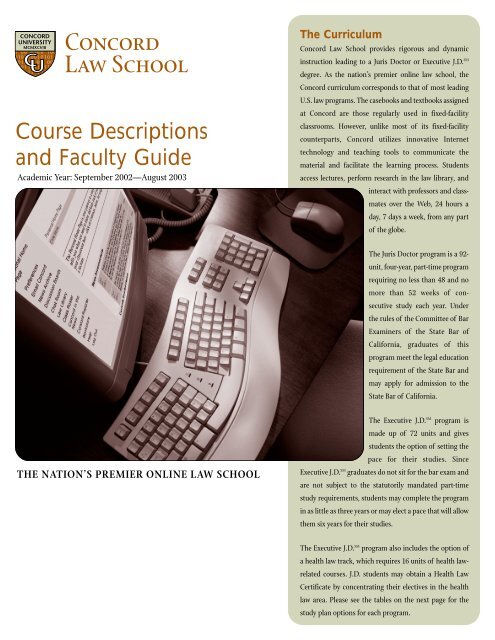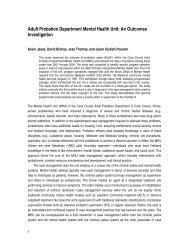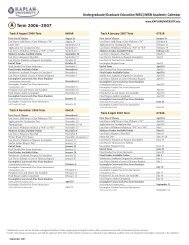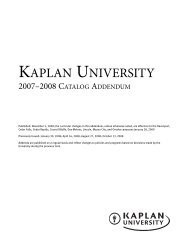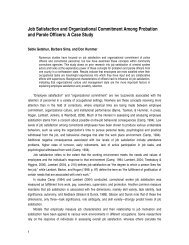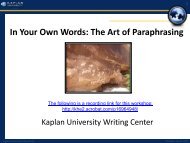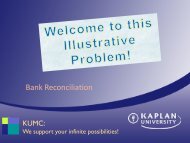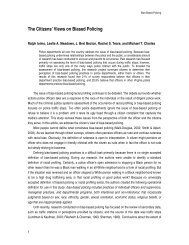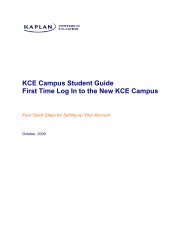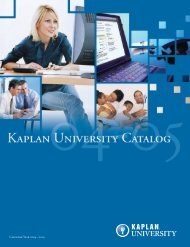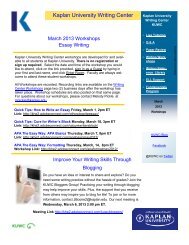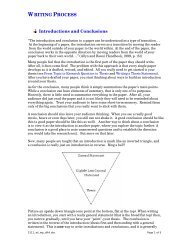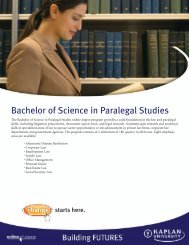Course Descriptions and Faculty Guide - Kaplan University | KU ...
Course Descriptions and Faculty Guide - Kaplan University | KU ...
Course Descriptions and Faculty Guide - Kaplan University | KU ...
- No tags were found...
Create successful ePaper yourself
Turn your PDF publications into a flip-book with our unique Google optimized e-Paper software.
<strong>Course</strong> <strong>Descriptions</strong><strong>and</strong> <strong>Faculty</strong> <strong>Guide</strong>Academic Year: September 2002—August 2003The CurriculumConcord Law School provides rigorous <strong>and</strong> dynamicinstruction leading to a Juris Doctor or Executive J.D. SMdegree. As the nation’s premier online law school, theConcord curriculum corresponds to that of most leadingU.S. law programs. The casebooks <strong>and</strong> textbooks assignedat Concord are those regularly used in fixed-facilityclassrooms. However, unlike most of its fixed-facilitycounterparts, Concord utilizes innovative Internettechnology <strong>and</strong> teaching tools to communicate thematerial <strong>and</strong> facilitate the learning process. Studentsaccess lectures, perform research in the law library, <strong>and</strong>interact with professors <strong>and</strong> classmatesover the Web, 24 hours aday, 7 days a week, from any partof the globe.The Juris Doctor program is a 92-unit, four-year, part-time programrequiring no less than 48 <strong>and</strong> nomore than 52 weeks of consecutivestudy each year. Underthe rules of the Committee of BarExaminers of the State Bar ofCalifornia, graduates of thisprogram meet the legal educationrequirement of the State Bar <strong>and</strong>may apply for admission to theState Bar of California.THE NATION’S PREMIER ONLINE LAW SCHOOLThe Executive J.D. SM program ismade up of 72 units <strong>and</strong> givesstudents the option of setting thepace for their studies. SinceExecutive J.D. SM graduates do not sit for the bar exam <strong>and</strong>are not subject to the statutorily m<strong>and</strong>ated part-timestudy requirements, students may complete the programin as little as three years or may elect a pace that will allowthem six years for their studies.The Executive J.D. SM program also includes the option ofa health law track, which requires 16 units of health lawrelatedcourses. J.D. students may obtain a Health LawCertificate by concentrating their electives in the healthlaw area. Please see the tables on the next page for thestudy plan options for each program.
Program OfferingsJuris Doctor Program<strong>Course</strong>sUnitsFIRST YEARContracts 8Torts 8Criminal Law 6Legal Writing <strong>and</strong> Test-Taking Skills 2SECOND YEARCivil Procedure 6Constitutional Law 6Criminal Procedure 4Real Property 8THIRD YEARCorporations 4Evidence 6Legal Analysis <strong>and</strong> Writing 4Legal Research 2Professional Responsibility 4Elective 2-4FOURTH YEARCommunity Property 4Remedies/Advanced Legal Analysis 6Wills <strong>and</strong> Trusts 6Electives (choose 6-8 units)*Health Law 4Federal Taxation 4Intellectual Property 4Cyberlaw 4Externship 4Advocacy —Theories, Tactics, 3& TechniquesAdvanced Advocacy 3Social Security Law 3* For additional Health Law electives, see Executive J.D. SM Health Law Track.Tuition <strong>and</strong> Fees<strong>Course</strong>sExecutive J.D. SM ProgramFIRST YEARUnitsContracts 8Torts 8Criminal Law 6Legal Writing <strong>and</strong> Test-Taking Skills 2SECOND YEARCivil Procedure 6Constitutional Law 6Electives 12THIRD YEAREvidence 6Legal Analysis <strong>and</strong> Writing 2Legal Research 2Ethics 2Electives 12ElectivesThe total number of units required for the Juris Doctor degree is 92completed over four years with tuition paid annually. The currentannual tuition for the Juris Doctor program is $7,000. (The annualtuition is subject to change.) The entire tuition for the Executive J.D. SMdegree is $21,000 (three years at $7,000 per year) with tuition due at thecommencement of the program. The yearly tuition includes a $100non refundable registration fee. In addition to the tuition, there is anon refundable student services fee for the Juris Doctor program that ischarged each academic year. The current student services fee forstudents starting their academic year in September 2002 or continuingtheir enrollment through September 2002 is $175. For subsequent classstarts or continuing enrollment, students must pay the student servicesfee effective at that time. Any units taken above 24 units annually arecharged at the rate of $275 per unit.Corporations 4Health Law 4Criminal Procedure 4Federal Taxation 4Community Property 4Wills <strong>and</strong> Trusts 6Intellectual Property 4Cyberlaw 4Real Property 8Executive J.D. SM Health Law Track<strong>Course</strong>sUnitsFIRST YEARContracts 8Torts 8Criminal Law 6Legal Writing <strong>and</strong> Test-Taking Skills 2SECOND YEARConstitutional Law 6Legal Analysis <strong>and</strong> Writing 2Legal Research 2Health Law 4Electives 10THIRD YEAREthics (may be taken second or third year) 2Electives 22Electives (At least 12 units must come from thecourses below for which the required HealthLaw course is a prerequisite; the remaining 10units may come from other Executive J.D. SMelectives or required courses.)Bioethics 4Health Care Policy 4Health Care Organizations <strong>and</strong> Finance 4Risk Management in Health Care 2Administrative Law for theHealth Care Practioner2Externship 2E-Health <strong>and</strong> Telemedicine 2Products Liability (Health) 2Medical Malpractice/Professional Liability2The tuition fee does not include the student’s own costs, whichinclude: textbooks ($300-500 per year); MS Word TM (market rate) orWordPerfect TM (student rate $70); computer equipment ($1,000);Personal Verisign Digital Certificate ($14.95 per year); <strong>and</strong> an InternetService Provider to access the curriculum ($23.90 per month).Additional optional charges: A Concord Student Identification Cardis $10; a Concord transcript is $5.Two forms of financing are available: Concord Tuition Financing,which offers convenient monthly payments after a down payment; <strong>and</strong>Sallie Mae Financing (through SLM Corporation), which allowsstudents to finance the entire tuition.1To view the Concord catalog, including a description of courses <strong>and</strong> schoolpolicies, please refer to the Concord Law School website atwww.concordlawschool.com
<strong>Course</strong> <strong>Descriptions</strong>First Year <strong>Course</strong>s:Contracts (8 Units)Required: All programsThis course examines the legal theories <strong>and</strong> principles relating to parties<strong>and</strong> agreements <strong>and</strong> their resultant obligations or benefits. Coveredtopics include: Formation, Conditions, <strong>and</strong> Remedies of Contracts;Bargained for Consideration; Third-Party Contracts (includingAssignments <strong>and</strong> Delegations); Statute of Frauds; Parole Evidence;Impossibility of Performance; <strong>and</strong> Frustration of Purpose.Criminal Law (6 Units)Required: All programsThis course examines the state’s ability to punish individuals for wrongscommitted. Homicide, Theft (including Robbery <strong>and</strong> Burglary), Assault,Rape, Kidnapping, <strong>and</strong> Arson as well as Attempts, Conspiracies, <strong>and</strong>Solicitation are covered in depth. The state of mind required to commita crime, including Justifications <strong>and</strong> Excuses, is thoroughly covered.Legal Writing <strong>and</strong> Test-Taking Skills (2 Units)Required: All programsThis course is designed to teach the ability to spot legal issues in factualsituations <strong>and</strong> form legal arguments <strong>and</strong> theories. Additionally,students demonstrate factual analysis <strong>and</strong> reasoning to buttress theirarguments <strong>and</strong> conclusions.Torts (8 Units)Required: All programsThis course explores the study of civil liability relating to intentionalacts <strong>and</strong> violation of duties imposed by law. Additionally, legalwrongs committed by a private person upon the person or property ofanother independent of a contractual relationship are covered indetail in this course. Topics include: Intentional Torts, Negligence,Strict Liability, Product Liability, Nuisance, Defamation, Invasion ofPrivacy, <strong>and</strong> Misrepresentation.Upper Division <strong>Course</strong>s:Administrative Law for theHealth Care Practitioner (2 Units)Elective: Juris Doctor; Executive J.D. SM Health, Prerequisite: Health LawThis course reviews administrative law, particularly where related tohealth care administrative agencies. It compares federal <strong>and</strong> statelicensing, permits, <strong>and</strong> appeals processes, as well as the adoption,modification, <strong>and</strong> judicial review of agency rules <strong>and</strong> decisions.Students analyze the process of adjudication of benefits <strong>and</strong> penalties<strong>and</strong> evaluate strategies to prepare for inspections <strong>and</strong> subpoenas fromfederal <strong>and</strong> state administrative agencies.Advanced Advocacy (3 Units)Elective: Juris Doctor, Prerequisite: Advocacy—Theories,Tactics,<strong>and</strong> TechniquesOffered at the William Mitchell College of Law (WMCL) Summer SkillsProgram in St. Paul, Minnesota, this is an eight (8) day, in-person course.The course is an intense, learning-by-doing trial skills course. Studentscontinually perform <strong>and</strong> are critiqued live <strong>and</strong> on videotape byexperienced trial lawyers. Topics include: Case Analysis; OpeningStatements; Direct <strong>and</strong> Cross Examinations; Examination of Lay<strong>and</strong> Expert Witnesses; Impeachment, Rehabilitation, <strong>and</strong> RefreshingRecollection; Introduction of Evidence <strong>and</strong> DemonstrativeExhibits; Closing Arguments; Jury Selection; <strong>and</strong> Ethics <strong>and</strong>Professional Responsibility.Please Note: Students register directly with <strong>and</strong> pay tuition (at the WMCL J.D.rate) directly to the William Mitchell College of Law. The course is gradedon a pass/fail basis by WMCL. The units are fully transferable to Concord.Advocacy—Theories, Tactics,<strong>and</strong> Techniques (3 Units)Elective: Juris Doctor, Prerequisite to Advanced AdvocacyOffered online in partnership with the William Mitchell College of Law,this course introduces students to the fundamentals of the courtroom<strong>and</strong> oral advocacy. Interactive modules allow students to study thefoundation of effective advocacy <strong>and</strong> to learn by doing. Students areexposed to trial tactics <strong>and</strong> techniques including: opening statements;direct <strong>and</strong> cross examinations; introduction of evidence; <strong>and</strong> closingarguments. Students are assessed <strong>and</strong> receive feedback on theirperformances via videotape presentations.Please Note: In addition to Concord tuition per unit, students will berequired to pay a $500 program fee. Students must have access or arrangeaccess to videotaping equipment (VHS) to tape their own performances.Students are also responsible for shipment of videotape performances toWMCL faculty.Bioethics (4 Units)Elective: Juris Doctor; Executive J.D. SM Health, Prerequisite: Health LawThis course examines the legal, ethical, <strong>and</strong> political implications ofbiological <strong>and</strong> technological advances in the following areas: humanreproduction, fetal-maternal decision making, surrogacy, humangenetics, death <strong>and</strong> dying of children <strong>and</strong> adults, physician-assisteddeath, human subjects research, <strong>and</strong> distributive justice in health care.These issues are addressed from the st<strong>and</strong>point of the stakeholders –—patients, health care providers, <strong>and</strong> government policy makers.Civil Procedure (6 Units)Required: Juris Doctor; Executive J.D. SM , Elective: Executive J.D. SM HealthAccess to the U.S. court system is the focus of this course. ProperJurisdiction <strong>and</strong> Venue (including Long Arm Statutes <strong>and</strong> MinimumContacts) are covered in detail. Other topics include: Pleadings, Joinder ofParties <strong>and</strong> Claims, Class Actions, Discovery, Summary Judgment,Directed Verdict, Res Judicata, Collateral Estoppel, <strong>and</strong> the Appeal Process.Community Property (4 Units)Required: Juris Doctor, Elective: Executive J.D. SM / Executive J.D. SM HealthThis course covers the law of Community Property <strong>and</strong> Division ofMarital Assets in California. Specific topics include: theCharacterization of Property as Separate or Community, Creditors’Rights, Third-Party Transfers, <strong>and</strong> the Resolving of Disputes upon theTermination of a Relationship or the Death of a Party.2
Constitutional Law (6 Units)Required: All programsThis course examines the organization <strong>and</strong> framework of the federalgovernment, the distribution of political <strong>and</strong> governmental authorities<strong>and</strong> functions, <strong>and</strong> the fundamental principles that regulate therelationship between the government <strong>and</strong> its citizens. Specific topicsinclude the Source of Judicial Review, the Powers of Legislative <strong>and</strong>Executive Branches, the Authority Reserved for the States, Due Process,Equal Protection, <strong>and</strong> First Amendment Freedoms.Corporations (4 Units)Required: Juris Doctor, Elective: Executive J.D. SM /Executive J.D. SM HealthThis course covers the area of law relating to artificial persons or legalentities consisting of members acting with a common purpose.Particular emphasis is placed on the Formation of the Corporate Unit,the Sale of Shares (including Federal Securities Law), the Operation <strong>and</strong>Management of the Corporation, <strong>and</strong> the law covering Dividends,Repurchases, <strong>and</strong> Redemptions.Criminal Procedure (4 Units)Required: Juris Doctor, Elective: Executive J.D. SM /Executive J.D. SM HealthThis course focuses on the law governing the rights of the accused. Thetopics of Arrest, Search, Seizure, Confession, Self-Incrimination, PoliceLineups, Guilty Pleas, Double Jeopardy, Right to Counsel, <strong>and</strong>Ineffective Assistance of Counsel are covered in detail.Cyberlaw (4 Units)Elective: All programsThis broad survey course is designed to explore the legal, ethical, <strong>and</strong>technological issues involved in working in cyberspace. Topics include:Internet history; policy development; governance <strong>and</strong> regulation;jurisdiction; First Amendment <strong>and</strong> privacy; copyright <strong>and</strong> fair use;trademark <strong>and</strong> domain names; cybercrime <strong>and</strong> Internet security;electronic commerce <strong>and</strong> virtual transactions; discovery of electronicevidence; <strong>and</strong> legal practice issues on the Internet.E-Health <strong>and</strong> Telemedicine (2 Units)Elective: Juris Doctor; Executive J.D. SM Health, Prerequisite: Health LawThis course analyzes the implications <strong>and</strong> emerging legal issues relatedto electronic delivery of care, privacy of electronic patient records,reimbursement for health care, <strong>and</strong> health care education viateleconferencing, satellite/cable, <strong>and</strong> the Internet.Ethics (2 Units)Required: Executive J.D. SM /Executive J.D. SM HealthThis survey course examines the law relating to the ethical st<strong>and</strong>ardsthat govern attorneys <strong>and</strong> judges. Select sections of the ABA Rules ofProfessional Conduct, the Model Rules, <strong>and</strong> the ABA Code of JudicialEthics are covered.Evidence (6 Units)Required: Juris Doctor; Executive J.D. SM , Elective: Executive J.D. SM HealthThis course covers the substance of <strong>and</strong> means by which allegedmatters of fact are proved or disproved in court. Central topics includethe Requirements for the Introduction <strong>and</strong> Impeachment of Evidence,Relevancy, Character Evidence, Expert Testimony, Privileges, <strong>and</strong>Hearsay. The course also covers the Requirements of the Originals <strong>and</strong>Roles of Judges <strong>and</strong> Juries in the evaluation of evidence.Externship (4 Units)Elective: Juris DoctorThe Legal Education Experience Program (LEEP) provides studentswith the opportunity to experience the law in a practical setting.Students work under a supervising attorney in a judicial, law firm,public law office, corporate, or government setting. The student workswith the director of LEEP to identify an appropriate externship inhis/her location. This elective also requires additional course workincluding lectures, discussion groups, <strong>and</strong> writing assignments.Federal Taxation (4 Units)Elective: All programsThis course examines the fundamental concepts underlying the federalincome tax system, with emphasis on its history <strong>and</strong> current operation.Major topics explored include determination of gross income <strong>and</strong>deductions, timing issues, <strong>and</strong> disposition of property, with emphasison taxation of the individual.Health Care Organizations <strong>and</strong> Finance (4 Units)Elective: Juris Doctor; Executive J.D. SM Health, Prerequisites: Health Law,CorporationsThis course analyzes forms of health care business enterprises, specificstructures of health care organizations, <strong>and</strong> the interrelationshipbetween these health care structures, their financial incentives, <strong>and</strong>compliance requirements.Health Care Policy (4 Units)Elective: Juris Doctor; Executive J.D. SM Health, Prerequisite: Health LawThis course provides an introduction to the field of policy analysis,<strong>and</strong> the various techniques <strong>and</strong> concepts that are employed in thatfield. Examples of applications of those techniques to a variety ofhealth policy problems are explored.Health Law (4 Units)Required: Executive J.D. SM Health, Elective: Juris Doctor; Executive J.D. SMThis course introduces students to legal issues involving the healthcare system <strong>and</strong> health care providers. Areas covered include: thelegal issues surrounding licensing, quality control regulations,patient-professional relationships, health care organizations <strong>and</strong>structures, bioethical issues, <strong>and</strong> liability of health care professionals<strong>and</strong> institutions.Intellectual Property (4 Units)Elective: All programsThis is a survey course in the field of intellectual property law. Topicsinclude patent, copyright, <strong>and</strong> trademark law.3
Legal Analysis <strong>and</strong> Writing (2 Units)Required: Executive J.D. SM Health, Elective: Executive J.D. SMThis course is designed to allow students to apply their legal knowledgeto a series of writing exercises. In addition to having an opportunity torefresh writing skills, students will learn the basic forms of correct legalcitation. The documents students will prepare are the kinds a paralegalor a business or health care consultant with a legal background mightbe asked to complete.Legal Analysis <strong>and</strong> Writing (4 Units)Required: Juris DoctorThis course covers the practical basis of how to write the kind ofdocuments that make up a lawyer’s traditional practice: a Client AdviceLetter, an Office (Research) Memor<strong>and</strong>um, <strong>and</strong> a Memor<strong>and</strong>um of Lawin Support of or in Opposition to a dispositive motion— for example, aMotion for Summary Judgment. The course will also include an OralArgument.Legal Research (2 Units)Required: All programsThis course focuses on research skills <strong>and</strong> techniques, including the useof an online library. Students will be assigned various research projectsto be completed under the tutelage of their instructor.Medical Malpractice/Professional Liability (2 Units)Elective: Juris Doctor; Executive J.D. SM Health, Prerequisite: Health LawThis course examines the duty of health care professionals <strong>and</strong>organizations to provide appropriate care by addressing specific tortissues, practice guidelines <strong>and</strong> st<strong>and</strong>ards, applicable regulations, <strong>and</strong>data bank issues.Products Liability (Health) (2 Units)Elective: Juris Doctor; Executive J.D. SM Health, Prerequisite: Health LawThis course explores the legal aspects of health-related products,including medical devices, pharmaceuticals, <strong>and</strong> genetically engineeredtreatment modalities, as well as applicable toxic tort issues.Professional Responsibility (4 Units)Required: Juris DoctorThe law relating to the ethical st<strong>and</strong>ards that govern attorneys <strong>and</strong>judges is the focus of this course. It covers the ABA Rules of ProfessionalConduct, the Model Rules, <strong>and</strong> the ABA Code of Judicial Ethics.Real Property (8 Units)Required: Juris Doctor, Elective: Executive J.D. SM /Executive J.D. SM HealthThe law governing all aspects of Real Property <strong>and</strong> the Creation ofRights is the focus of this course. Additional topics include: OwnershipRights (including Present Estates), Co-Tenancy, Future Interests, <strong>and</strong>the Relations between L<strong>and</strong>lord <strong>and</strong> Tenant. Real Property Contracts,Statute of Fraud Problems, Real Property Mortgages, Conveyancing,<strong>and</strong> Adverse Possession are also discussed.Remedies/Advanced Legal Analysis (6 Units)Required: Juris DoctorThis course reviews both Legal <strong>and</strong> Equitable Remedies, focusing on theUnderlying Liability Theories that give rise to the Remedy <strong>and</strong> theRemedy itself. Special attention is given to Contract <strong>and</strong> Tort Remedies.Students will be exposed to the types of problems that they mayencounter in law practice, with particular emphasis on ones that cross avariety of disciplines. Final papers are similar to the performance testscurrently administered by the State Bar of California.Risk Management in Health Care (2 Units)Elective: Juris Doctor; Executive J.D. SM Health, Prerequisite: Health LawThis course explores various models <strong>and</strong> trends in risk managementprograms along with their components. The course will focus on allforms of risk <strong>and</strong> risk management in health care environments, frominitiation of care through completion of care.Social Security Law (3 Units)Elective: Juris DoctorOffered online through Cornell Law School, the course focusesespecially on how Social Security’s benefit rules relate to employment,families, <strong>and</strong> household composition, <strong>and</strong> how its procedures addressthe challenge of adjudicating the massive numbers of benefit claimsthat arise each year. The course introduces the general features of theSocial Security Act’s entitlement, benefit formulae, <strong>and</strong> proceduralrules; highlights those that pose the greatest difficulty to administrators<strong>and</strong> advocates; <strong>and</strong> surveys current proposals for change.Please Note: This course must be completed in a traditional semesterformat (24–26 weeks), from January to June 2003, <strong>and</strong> will be offered onlyon the Cornell website. Law students throughout the country willparticipate in the program. Students who satisfactorily complete the course<strong>and</strong> pass the final examination will receive certification by Cornell <strong>and</strong>credit granted by Concord. In addition to Concord tuition per unit, studentswill be required to pay a $500 program fee.Wills <strong>and</strong> Trusts (6 Units)Required: Juris Doctor, Elective: Executive J.D. SM /Executive J.D. SM HealthThis course covers the law of Estates <strong>and</strong> Trusts as applied in California<strong>and</strong> gives a general overview of how it applies in the rest of the country.Issues dealing with the Validity <strong>and</strong> Revocation of Wills are examined,particularly as they may affect Distribution of Assets of an Estate.Additionally, the laws of Express Trusts (including Creation <strong>and</strong>Administration), Charitable Trusts, <strong>and</strong> Consecutive Trusts are covered.Please Note: <strong>Course</strong> offerings are subject to change.SYSTEM REQUIREMENTSThe computer equipment utilized to access the Internet program mustmeet the minimum requirements below:Hardware/OS: Pentium 200MHz; 32MB or more of RAM; Windows® 95,Windows® 98 (suggested), Windows® 2000ME (final release versiononly), or Windows® NT 4.0 with Service Pack 4 or greater; 33.6 Kbps orbetter modem; 16 bit sound card <strong>and</strong> speakers; <strong>and</strong> 65,000-color orbetter video display card.Software: Microsoft® Internet Explorer 5.0 or higher or Netscape TM 4.7or higher; MS Word TM 6.0/95 or higher or WordPerfect 6 or higher; thefree version of the RealPlayer version 8.0 or higher (downloaded fromthe Internet); <strong>and</strong> the free version of Adobe® Acrobat® Reader TM 4.0 orhigher (downloaded from the Internet).4
Deans, <strong>Faculty</strong>, <strong>and</strong> LecturersDeans <strong>and</strong> DirectorsAssociate Dean, Dean of Students, Director ofAcademic Support, <strong>and</strong> Professor of Law; B.A.,<strong>University</strong> of Wisconsin; Ed.D., Harvard <strong>University</strong>;J.D., Harvard Law School. Member, State Bar ofMassachusetts. <strong>Course</strong>s: Legal Analysis <strong>and</strong> Writing.Associate Dean, First Year Programs <strong>and</strong> Professor ofLaw; B.A., <strong>University</strong> of California at Los Angeles;J.D., Whittier College of Law. Member, State Bar ofCalifornia. <strong>Course</strong>s: Contracts, Criminal Law, Torts,<strong>and</strong> Real Property.Jack R. GoetzPresident <strong>and</strong> DeanThe founding dean of Concord Law School, Jack R.Goetz is a recognized expert in the field of distancelearning. His vision <strong>and</strong> expertise contributed greatly tothe creation of Concord in 1998 <strong>and</strong> under his leadership,Concord has grown to serve a student body of more than1000 adults worldwide. Dean Goetz oversees all aspects ofthe Concord education, including curriculumdevelopment, faculty hiring, student services, academicsupport <strong>and</strong> counseling, career services, operations, <strong>and</strong>management of accreditation issues.Martha SiegelAssociate DeanDean of StudentsDirector ofAcademic SupportProfessor of LawGregory Br<strong>and</strong>esAssociate Deanof <strong>Faculty</strong>Professor of LawDean Siegel received her doctorate in educationfrom Harvard <strong>University</strong> <strong>and</strong> is a graduate ofHarvard Law School. She has an extensive backgroundin developing legal writing curriculumincluding as the former director of the WritingAssistance <strong>and</strong> Academic Support Program <strong>and</strong> theLegal Practice Skills Program at Suffolk <strong>University</strong>Law School. Dean Siegel directs the legal writing <strong>and</strong>academic support programs at Concord.Associate Dean of <strong>Faculty</strong> <strong>and</strong> Professor of Law;B.A., Marycrest College; J.D., Loyola <strong>University</strong> ofChicago Law School. Member, State Bars of Illinois<strong>and</strong> Colorado. <strong>Course</strong>s: Contracts, Criminal Law,Criminal Procedure, <strong>and</strong> Torts.Dean Br<strong>and</strong>es is a graduate of Loyola <strong>University</strong>of Chicago Law School <strong>and</strong> has taught law studentsthroughout the last decade. He has lectured extensivelyon contract, business, privacy, <strong>and</strong> employmentlaw, <strong>and</strong>, among other written works, hasrecently published Straight Talk on Workplace Law.Steven BracciAssociate DeanFirst Year ProgramsProfessor of LawCass<strong>and</strong>ra ColchagoffAssociate DeanProfessor of LawDean Bracci is a well-known lecturer <strong>and</strong> hasbeen teaching law since 1979. A graduate ofWhittier College of Law, he has served as theacademic director for law school divisions of anumber of legal publishers. He is an expert inexamination technique <strong>and</strong> has conducted writing<strong>and</strong> test-taking seminars nationwide.Associate Dean <strong>and</strong> Professor of Law; B.A.,<strong>University</strong> of Toledo; J.D., <strong>University</strong> of TulsaCollege of Law. Member, State Bar of Oklahoma.<strong>Course</strong>s: Contracts, Criminal Law, <strong>and</strong> Torts.Dean Colchagoff is a graduate of the <strong>University</strong>of Tulsa College of Law, where she was the articleseditor on the Law Journal. Professor Colchagoff hasbeen in private practice in a general litigation <strong>and</strong>appellate practice <strong>and</strong> is also involved in continuinglegal education programs.In April 2002, the Distance Education <strong>and</strong> TrainingCouncil (DETC) recognized Dean Goetz for his e-learningexpertise with a Distinguished Recognition Award foroutst<strong>and</strong>ing contributions to the advancement of distanceeducation. Dean Goetz served on the DETC Board ofTrustees from 2000 to 2002, has worked with on-site DETCaccreditation teams, <strong>and</strong> currently serves on the DETCTask Force on Assessment of Learning Outcomes. In May2002, Dean Goetz was named chair of the BusinessSt<strong>and</strong>ards Committee as well as vice-chair of theEducational St<strong>and</strong>ards Committee.Craig GoldDirector of LibraryServicesProfessor of LawDirector of Library Services <strong>and</strong> Professor of Law;B.S., Arizona State <strong>University</strong>; J.D., <strong>University</strong> ofArizona College of Law. Member, State Bar ofCalifornia. <strong>Course</strong>s: Legal Research <strong>and</strong> Cyberlaw.Professor Gold is a graduate of the <strong>University</strong> ofArizona College of Law <strong>and</strong> is an expert in distancelearning. He has developed a number of Internetbasedprograms, particularly legal research <strong>and</strong> educationprograms, for practitioners <strong>and</strong> law students.His work has assisted thous<strong>and</strong>s of law students <strong>and</strong>lawyers in passing the bar examination or meetingtheir continuing legal education requirements.Douglas HoldenAssistant Dean of<strong>Faculty</strong> DevelopmentProfessor of LawAssistant Dean of <strong>Faculty</strong> Development <strong>and</strong>Professor of Law; B.S., Regis College; J.D.,Pepperdine <strong>University</strong> School of Law. Member, StateBar of Colorado. <strong>Course</strong>s: Contracts, Criminal Law,Torts, <strong>and</strong> Corporations.In addition to having maintained an active practice,Dean Holden has extensive experience in distanceeducation, including developing <strong>and</strong> teachingbusiness law courses for the <strong>University</strong> of Phoenix.In addition, the Board of Bar Governors of the State Barof California appointed Dean Goetz to a three-year term asa member of the Law School Council, which advises theCommittee of Bar Examiners on various law schooleducation matters. Dean Goetz also serves as a member ofthe State Bar of California Committee of Bar ExaminersTask Force on Accreditation of Online Law Schools.5A frequent speaker at distance education <strong>and</strong> legalconferences, Dean Goetz has delivered presentations onConcord’s innovative education model, accreditationissues, faculty training <strong>and</strong> evaluation, <strong>and</strong> studentretention.Dean Goetz has more than 20 years of experience asa legal educator, including professorial as well asadministrative <strong>and</strong> supervisory experience. While personallyteaching Evidence, Remedies, <strong>and</strong> Legal Alalysis <strong>and</strong>Writing, he has also directed law faculty nationwide on thedevelopment <strong>and</strong> delivery of legal education programs,including classes for state bar examinations that haveserved tens of thous<strong>and</strong>s of students.Dean Goetz received his B.A. in 1976 from San DiegoState <strong>University</strong>, his J.D. in 1979 from Boston <strong>University</strong>School of Law, <strong>and</strong> his M.B.A. in 1990 from Pepperdine<strong>University</strong>. He has been a member of the California Barsince 1979 <strong>and</strong> was admitted to the Federal Court CentralDistrict of California in 1983.Robert A. HullAssistant Deanof AcademicsProfessor of LawKathleen ReaganAssistant Deanof StudentsProfessor of LawAndrew TallmerAssistant Directorof ExaminationsProfessor of LawAssistant Dean of Academics <strong>and</strong> Professor ofLaw; B.A., San Diego State <strong>University</strong>; J.D.,<strong>University</strong> of San Diego School of Law. Member,State Bars of California, Arizona, Missouri, <strong>and</strong>Nevada. <strong>Course</strong>s: Contracts, Criminal Law, Torts,<strong>and</strong> Constitutional Law.Dean Hull writes extensively on legal topics, <strong>and</strong>his substantive law guides <strong>and</strong> practice materialshave been used by law students <strong>and</strong> practitionersnationwide. He is a cum laude graduate of the<strong>University</strong> of San Diego School of Law <strong>and</strong> hastaught for 14 years. His expertise includes curriculumdevelopment <strong>and</strong> writing testing materials.Assistant Dean of Students <strong>and</strong> Professor of Law;B.A., <strong>University</strong> of Virginia; J.D., Tulane Law School.Member, State Bar of Massachusetts.Dean Reagan was an assistant district attorney,running a prosecuting unit <strong>and</strong> doing appellatework. In addition to her Concord responsibilities,she is a freelance writer.Assistant Director of Examinations <strong>and</strong> Professor ofLaw; B.A., Union College of Union <strong>University</strong>; J.D.,Albany Law School. Member, State Bars of NorthCarolina <strong>and</strong> New York. <strong>Course</strong>s: Contracts,Criminal Law, <strong>and</strong> Torts.Professor Tallmer has been involved in the publicpolicy arena for much of his career, including havingtaught <strong>and</strong> developed legal training for public safetyagencies at the North Carolina Justice Academy. Heis also an experienced trial attorney, having workedas an assistant district attorney in New York.C<strong>and</strong>ace Elliott PersonDirector ofHealth Law ProgramAssistant Dean ofHealth Law LL.M.ProgramProfessor of LawStacey SharpDirector of ExecutiveJ.D. ProgramAssistant Deanof StudentsProfessor of LawWilliam I. WestonAssociate Deanof Program DevelopmentProfessor of LawDirector of Health Law Program, Assistant Dean ofthe Health Law LL.M. Program, <strong>and</strong> Professor of Law;B.S.N., <strong>University</strong> of Iowa; M.S., <strong>University</strong> ofMinnesota; J.D., Thomas M. Cooley Law School.Member, State Bar of Michigan. <strong>Course</strong>s: Health Law.Professor Person has extensive experience in thehealth care field as a clinical practitioner, in management,<strong>and</strong> as an educator. As a graduate of theThomas M. Cooley Law School, the focus of herpractice <strong>and</strong> teaching is in the areas of health law,cyberlaw, <strong>and</strong> legal education. Professor Person hasdeveloped judicial education programs <strong>and</strong> is a consultanton legal <strong>and</strong> policy issues related to theInternet <strong>and</strong> Web technology.Director of Executive J.D. Program, Assistant Dean ofStudents, <strong>and</strong> Professor of Law; B.A., <strong>University</strong> ofSouthern California; J.D., Thomas Jefferson School ofLaw. Member, State Bar of California.Dean Sharp is a graduate of Thomas JeffersonSchool of Law. In addition to her work in privatepractice, she has many years of experience assistinglaw students in developing legal analysis <strong>and</strong>writing skills.Associate Dean of Program Development <strong>and</strong>Professor of Law; A.B.M.L., Loyola College ofMaryl<strong>and</strong>; J.D., <strong>University</strong> of Maryl<strong>and</strong>. Member,State Bars of Maryl<strong>and</strong> <strong>and</strong> the District ofColumbia. <strong>Course</strong>s: Contracts, Criminal Law, Torts,<strong>and</strong> Legal Education Experience Program.Dean Weston has been a law school professor forover 25 years at the <strong>University</strong> of Baltimore <strong>and</strong> atFlorida Coastal School of Law. On both faculties heheld dean positions, including director of professionalskills education at Florida Coastal. Dean Weston isactive in ethics <strong>and</strong> professionalism committees atthe state level <strong>and</strong> with the ABA. He has writtenextensively in the family law <strong>and</strong> legal ethics areas.
ProfessorsH. Beau Baez, IIIProfessor of LawProfessor of Law; B.A., Liberty <strong>University</strong>; J.D.,LL.M., Georgetown <strong>University</strong>. Member, State Barsof Virginia <strong>and</strong> the District of Columbia. <strong>Course</strong>s:Civil Procedure, Taxation, Contracts, Criminal Law,<strong>and</strong> Torts.Professor Baez is counsel to the National NexusProgram at the Multistate Tax Commission inWashington, D.C. He has also served as a legal writerfor various tax publishers. His LL.M. fromGeorgetown <strong>University</strong> Law Center is in taxation.Sara Berman-BarrettProfessor of LawProfessor of Law; B.A., <strong>University</strong> of CaliforniaSanta Barbara; J.D., <strong>University</strong> of California, LosAngeles. Member, State Bar of California. <strong>Course</strong>s:Criminal Procedure <strong>and</strong> Community Property.Professor Berman-Barrett has been teaching lawstudents since 1991 in fixed-facility law schools aswell as through legal writing programs she has developed.Jason M. BurkProfessor of LawProfessor of Law; B.A., <strong>University</strong> of Illinois; J.D.,Drake <strong>University</strong> Law School. Member, State Bar ofNevada. <strong>Course</strong>s: Contracts, Criminal Law, <strong>and</strong> Torts.Professor Burk is a graduate of Drake <strong>University</strong>Law School. In addition to his teaching, he is apartner in a law firm specializing in medicalmalpractice <strong>and</strong> insurance defense litigation.James W. Claflin, Jr.Professor of LawProfessor of Law; B.A., J.D., Brigham Young<strong>University</strong>. Member, State Bars of Utah <strong>and</strong>Arizona. <strong>Course</strong>s: Contracts, Criminal Law<strong>and</strong> Torts.Professor of Law; B.S., California State <strong>University</strong>;J.D., <strong>University</strong> of La Verne College of Law. Member,State Bar of California. <strong>Course</strong>s: Real Property <strong>and</strong>Legal Analysis <strong>and</strong> Writing.Professor of Law; B.S., <strong>University</strong> of Illinois; J.D.,Southern Illinois <strong>University</strong>. Member, State Bar ofIllinois. <strong>Course</strong>s: Contracts, Criminal Law, Torts, <strong>and</strong>Wills <strong>and</strong> Trusts.Professor Claflin maintains an active generalbusiness litigation practice in addition to histeaching. As an adjunct faculty member atBrigham Young <strong>University</strong> Law School, he teacheslegal research <strong>and</strong> writing in the advocacyprogram. Professor Claflin is a graduate of BYULaw School where he was the articles editor of theLaw Review.Alana J. DeGarmoProfessor of LawProfessor DeGarmo is a sole practitioner whospecializes in legal research. A former officer in theU.S. Air Force, she is also an adjunct law professor ina legal research <strong>and</strong> writing program.James W. DodgeProfessor of LawProfessor Dodge serves in the Illinois senateminority leader’s office as legal counsel to the judiciarycommittee. He has worked in various state legaloffices including the Illinois Attorney General’soffice. In addition, Professor Dodge is an instructorin paralegal <strong>and</strong> continuing education programs.Joseph P. GaughanProfessor of LawProfessor of Law; B.S., Northeastern <strong>University</strong>; J.D.,Suffolk <strong>University</strong> School of Law. Member, State Barof Massachusetts. <strong>Course</strong>s: Criminal Procedure.Professor Gaughan has an extensive record as adistrict attorney <strong>and</strong> prosecutor. He has been thelead prosecutor in over 50 major felony trials, as wellas a speaker at many district attorney <strong>and</strong> triallawyer conferences <strong>and</strong> an adjunct professor in legaleducation programs.Linda J. HiemerProfessor of LawProfessor of Law; B.A., Lafayette College; J.D.,Dickinson School of Law. Member State Barsof Alaska <strong>and</strong> Idaho. <strong>Course</strong>s: Legal Analysis<strong>and</strong> Writing.Professor Hiemer is in private practice <strong>and</strong>focuses on business law, including mergers<strong>and</strong> acquisitions, venture capital, securities,<strong>and</strong> commercial litigation.Shaun G. JamisonProfessor of LawProfessor of Law; B.S., National College; J.D.,<strong>University</strong> of North Dakota. Member, State Bar ofMinnesota. <strong>Course</strong>: Real Property.Professor Jamison is a reference attorney coordinatorfor West Group, where he is involved in attorneytraining <strong>and</strong> support. He also trains West referenceattorneys <strong>and</strong> has taught law <strong>and</strong> businesscourses in undergraduate <strong>and</strong> paralegal programs.Professor Jamison has taught <strong>and</strong> written fornumerous continuing legal education courses<strong>and</strong> publications.Scott F. JohnsonProfessor of LawProfessor of Law; B.A., <strong>University</strong> of North Carolinaat Charlotte; J.D., Franklin Pierce Law Center.Member, State Bar of New Hampshire. <strong>Course</strong>s:Constitutional Law <strong>and</strong> Civil Procedure.Professor Johnson is in private practice with afocus in education law, health law, employment law,<strong>and</strong> civil rights law. He also works with <strong>and</strong> is a legalpanel member of the New Hampshire CivilLiberties Union.Marc A. JonesProfessor of LawProfessor of Law; B.A., Northeastern Illinois<strong>University</strong>; J.D., Howard <strong>University</strong> School of Law;LL.M., George Washington <strong>University</strong> School ofLaw. Member, State Bar of Illinois. <strong>Course</strong>s:Criminal Procedure.Professor Jones is an appellate defense attorneywith the U.S. Air Force. He also serves as an adjunctfaculty advisor to various courses <strong>and</strong> workshops.Professor of Law; B.A., J.D., <strong>University</strong> of Maryl<strong>and</strong>.Member, State Bars of Pennsylvania <strong>and</strong> Maryl<strong>and</strong>.<strong>Course</strong>s: Constitutional Law, Evidence, <strong>and</strong>Criminal Procedure.Professor Kaufman has extensive experience withthe criminal justice system both as a trial attorneyMark A. Kaufman <strong>and</strong> as teacher. He has worked at the trial <strong>and</strong>Professor of Law appellate level on a wide range of family, criminal,<strong>and</strong> poverty/welfare law issues. Professor Kaufmanhas taught at Villanova <strong>University</strong> School of Law,where he developed a cooperative clinical educationprogram, <strong>and</strong> at Widener <strong>University</strong> in its criminaljustice program.Robert J. L<strong>and</strong>ryProfessor of LawProfessor of Law; B.A., <strong>University</strong> of NorthAlabama; J.D., <strong>University</strong> of Alabama School of Law.Member, State Bar of Alabama. <strong>Course</strong>s: Contracts,Criminal Law, Torts, <strong>and</strong> Real Property.Professor L<strong>and</strong>ry is the Assistant U.S.Bankruptcy Administrator for the Northern Districtof Alabama. He has also worked as a bankruptcyattorney <strong>and</strong> has written <strong>and</strong> taught extensively inthe field.Professor of Law; B.A., M.B.A, Clevel<strong>and</strong> State<strong>University</strong>; J.D., Clevel<strong>and</strong>-Marshall College of Law.Member, State Bar of Ohio. <strong>Course</strong>s: Federal TaxationProfessor Monsour has extensive teaching experiencein the taxation field. In addition to hisConcord courses, he teaches in the Golden GateEdward L. Monsour <strong>University</strong> Masters of Taxation Program.Professor of Law Additionally, Professor Monsour teaches at the<strong>University</strong> of California, Irvine, in its GraduateSchool of Management. He has also taught in taxationprograms for accounting professionals.Professor of Law; B.A., Berry College; J.D., Stetson<strong>University</strong> College of Law. Member, State Bars ofFlorida <strong>and</strong> Georgia. <strong>Course</strong>s: Contracts, CriminalLaw, Torts, <strong>and</strong> Intellectual Property.Professor Palmer is a legal editor. She has been astaff attorney with the Thirteenth Judicial CircuitMeredith L. Palmer <strong>and</strong> a litigator in private practice. Professor PalmerProfessor of Law also teaches business law as an adjunct at the<strong>University</strong> of Phoenix.Professor of Law; B.A., V<strong>and</strong>erbilt <strong>University</strong>; M.S.S.I.,Defense Intelligence College; J.D., Stetson <strong>University</strong>College of Law. Member, State Bar of Colorado.<strong>Course</strong>s: Criminal Procedure <strong>and</strong> Civil Procedure.Professor of Law; B.A., State <strong>University</strong> of New Yorkat Buffalo; J.D., Hofstra <strong>University</strong> School of Law.Member, State Bars of California, New York, <strong>and</strong> theDistrict of Columbia. <strong>Course</strong>s: Health Law.Professor of Law; B.A., Union College; J.D., AlbanyLaw School. Member, State Bars of New York <strong>and</strong>Georgia. <strong>Course</strong>s: Contracts, Criminal Law, Torts, <strong>and</strong>Civil Procedure.Professor Pleasant is in private practice concentratingon federal criminal defense <strong>and</strong> probateTimothy W. Pleasant work. Following law school, he was a Federal JudicialProfessor of Law Intern for the U.S. District Court, Middle District ofFlorida. He also has taught history <strong>and</strong> was a commissionedofficer in the U.S. Marine Corps.Judith SackProfessor of LawProfessor Sack maintains a private practice specializingin various aspects of elder, disability, <strong>and</strong>employment law. She has previously worked for thefederal government, including the U.S. Departmentof Justice. Professor Sack has also taught <strong>and</strong> developeddistance learning programs.Professor Van Detta has been in private practicefor 20 years <strong>and</strong> is currently of counsel to his firm. InJeffrey A. Van Detta his practice he has concentrated on labor law,Professor of Law employment discrimination, <strong>and</strong> federal court litigation,<strong>and</strong> has written extensively on related issues.Additionally, he teaches at the John Marshall LawSchool in Atlanta, Georgia.6
Visiting <strong>and</strong> Supplementary LecturersMary M. ChehSubjects:Constitutional LawProfessor Cheh joined the faculty at GeorgeWashington <strong>University</strong> National Law Center, whereshe is the Elyce Zenoff Research Professor of Law, in1979. A leading constitutional <strong>and</strong> national securitylaw specialist, she is widely published on subjectssuch as the First Amendment <strong>and</strong> criminal law <strong>and</strong>has been a frequent speaker <strong>and</strong> media commentatoron legal affairs. Professor Cheh was a member of theD.C. Circuit Task Force on Gender Bias in the Courts<strong>and</strong> has served as a consultant to the President’sCommission on Organized Crime.Rafael GuzmanSubjects:Criminal Law,Criminal Procedure,EvidenceProfessor Guzman is considered one of the nation’sleading lecturers in criminal law. He has taught at the<strong>University</strong> of Arkansas since 1967 <strong>and</strong> is a memberof the Arkansas Criminal Code Revision Committee<strong>and</strong> the Arkansas St<strong>and</strong>ards of Criminal JusticeProject. He has also co-authored PsychiatricEvaluation in Criminal Cases.Marci KellySubjects: Taxation,Wills <strong>and</strong> TrustsProfessor Kelly is a graduate of <strong>University</strong> of VirginiaSchool of Law <strong>and</strong> received her LL.M. from NewYork <strong>University</strong> School of Law. She is an associatedean <strong>and</strong> professor at Golden Gate <strong>University</strong> Schoolof Law. Professor Kelly is the author of several articles<strong>and</strong> book chapters <strong>and</strong> a frequent lecturer. Shehas served as chair of the Education Committee ofthe California State Bar. An expert in the fields ofwills <strong>and</strong> trusts <strong>and</strong> taxation, Professor Kelly willoversee the curriculum for those subjects.Lawrence LevineSubjects: TortsProfessor Levine is a recognized authority on tortlaw. He has taught at both McGeorge School of Law<strong>and</strong> the <strong>University</strong> of California, Hastings College ofthe Law since 1982. His published works include ATorts Anthology (co-authored with Davies <strong>and</strong>Kionka) <strong>and</strong> Underst<strong>and</strong>ing Torts (co-authored withDiamond <strong>and</strong> Madden).Arthur R. MillerSubjects:Civil Procedure,Intellectual PropertyProfessor Miller has taught at Harvard Law Schoolsince 1971. He is nationally known for his work oncourt procedure, copyright <strong>and</strong> unfair competition,<strong>and</strong> remedies. The courses he teaches include CivilProcedure, Copyright, <strong>and</strong> Complex Litigation; inrecent years he has also co-taught a seminar on law,information, <strong>and</strong> technology. Professor Miller is anacknowledged expert in the right to privacy, a subjecton which he has written, testified, debated, <strong>and</strong>helped formulate legislation. He is involved in avariety of televised legal educational programs,including as the former legal editor for ABC’s GoodMorning America. He is widely published <strong>and</strong> hisworks include Civil Procedure (with Fridenthal <strong>and</strong>Kane) <strong>and</strong> Civil Procedure Cases <strong>and</strong> Materials (withCound, Friedenthal, <strong>and</strong> Sexton).John E. MoyeSubjects:Contracts, CorporationsProfessor Moye is an international lawyer who lectures<strong>and</strong> teaches in commercial banking <strong>and</strong> businessorganization law throughout the United States.During his seven years teaching at the <strong>University</strong> ofDenver, he was voted Professor of the Year on fouroccasions. His written work includes CommercialTransactions Under the Uniform Commercial CodeProblem Series, The Law of Business Organizations, <strong>and</strong>Moye’s Loan Documentation Manual.Professor Peck is a former California State Bar Courttrial judge <strong>and</strong> has long practiced in the field of legalethics <strong>and</strong> professional responsibility. She served asethics counsel to the State Bar of California <strong>and</strong> theAmerican Bar Association, was a member of theState Bar Commission to revise the Rules ofProfessional Conduct, <strong>and</strong> has taught in a number ofEllen Peck law schools.Subjects:Professional Responsibility1133 Westwood Boulevard, Suite 2010 • Los Angeles, California 90024Application Information: Tel: 1-800-439-4794 (Toll Free) • Fax: 1-888-564-6745 (Toll Free)Website: www.concordlawschool.com • Email: infoconcord@concordlawschool.com© Copyright 2002 Concord Law SchoolM-CL-COURSE 09/02


